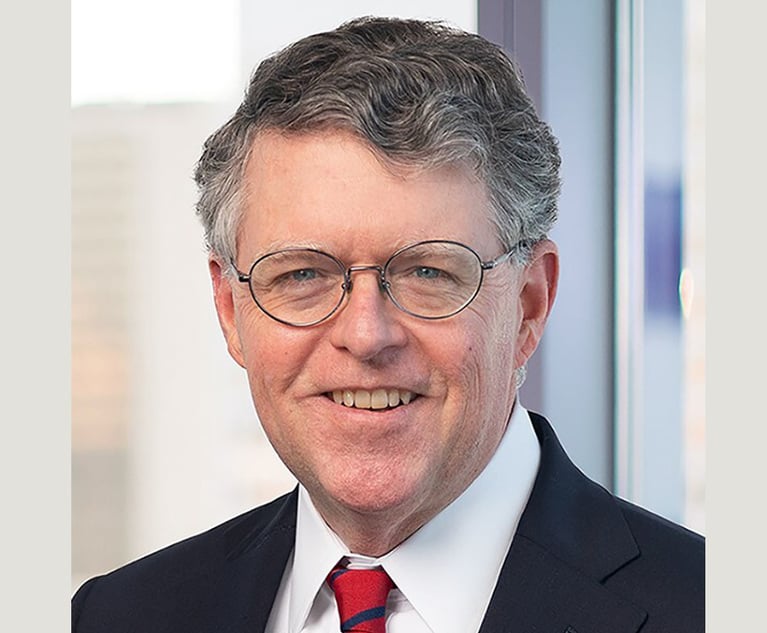As SCOTUS Abandons Workers, States, Cities Must Fill Void
Now more than ever, states and cities must play a role in fighting for the rights of workers and ensuring the most vulnerable populations have access to those protections.
June 07, 2018 at 03:06 PM
5 minute read

Nearly 25 million employees lost their day in court when the U.S. Supreme Court in Epic Systems v. Lewis gutted the ability of American workers to stand up for themselves when their rights are threatened by their employers. The May decision is the latest example of the federal government abandoning workers, and cities and states must step into the void.
Threats to workers' rights abound. Construction workers are forced to work 45 hours a week, but are paid for only 40 hours to avoid overtime. Restaurant owners withhold waitstaff's tips. Employers fail to pay day laborers promised wages under threats of deportation. And we don't have to look far into the #MeToo movement to find numerous disturbing examples of workplace sexual harassment. Employees have always faced challenges protecting themselves from abuses by employers who can afford better lawyers, withstand the costs of litigation, and retain control of the very terms of the employment contract.
But the 5-4 decision, which states that employers can contractually forbid workers from collectively arbitrating legal disputes, makes these challenges nearly insurmountable. In a vigorous dissent, Justice Ruth Ginsburg warned that the decision will result in underenforcement of the laws put in place to protect workers: The payoff from an individual arbitration dispute can be low, while the cost of arbitration is high. This reality, coupled with the fear of retaliation, means that employees are unlikely to proceed against employers in one-on-one arbitrations. So the decision essentially gives employers a free pass to violate minimum wage regulations, protections against workplace sexual harassment, and other labor laws.
The impact of mandatory arbitration clauses and class waivers has long presented similar challenges in the consumer context. And since the Supreme Court's 2011 decision in AT&T Mobility v. Concepcion, companies providing consumer financial products have been able to use mandatory arbitration clauses to deny customers the right to jointly seek relief from illegal behavior. As former Consumer Financial Protection Bureau director and Ohio gubernatorial candidate Richard Cordray explained, “This practice has evolved to the point where it effectively functions as a kind of legal lockout.” By inserting class waivers in their contracts, consumer financial service companies can block class actions and insulate themselves from liability.
Scholars and advocates have highlighted the improbability of consumers pursuing individual arbitrations. Their analysis is consistent with how consumers describe their own behavior when faced with being scammed or defrauded: when the Consumer Financial Protection Bureau asked consumers in its 2015 Arbitration Study what they would do if they saw fees on their credit card bills that they knew were incorrectly assessed, the bureau learned that consumers rarely pursue formal claims, in arbitration or litigation. This means that violations of the laws that protect consumers frequently go unaddressed. The Epic Systems decision takes a practice that we know to be harmful to individual consumer rights and expands it to employment, where almost 54 percent of nonunionized companies already impose mandatory arbitration agreements.
While the judiciary limits the ability of employees to enforce their rights and the federal government sides with employers, state and local authorities are uniquely situated to protect employees from dishonest employers. Many states and localities already have employee protection statutes on the books ready to be enforced. And some jurisdictions have taken up the cause. Just last week, the Manhattan district attorney began prosecuting a construction workers' wage theft case that alleges over $1.7 million in stolen wages. In 2016, the California Labor Commission worked with the San Diego district attorney to return $20,000 in wage loss theft from a local restaurant, leading to a criminal conviction.
In addition, many state attorneys general have units dedicated to enforcing labor laws. For example, the Massachusetts attorney general's Fair Labor Division is responsible for enforcing the state's wage and hour, public construction and child labor laws. Earlier this year, the division secured $95,000 in restitution and penalties from a staffing agency for an illegal scheme that cheated workers out of minimum wage, overtime and earned sick time pay.
These efforts can serve as models for employee protection, particularly when federal protectors are dormant and private plaintiffs are muzzled. More attention and resources devoted to these are needed in every state. Now more than ever, states and cities must play a role in fighting for the rights of workers and ensuring the most vulnerable populations have access to those protections.
Joanna Pearl served as enforcement chief of staff and acting principal deputy enforcement director at the Consumer Financial Protection Bureau. She is now the legal director at Public Rights Project, a nonpartisan nonprofit providing state and local prosecutors with resources to proactively enforce their residents' legal rights.
This content has been archived. It is available through our partners, LexisNexis® and Bloomberg Law.
To view this content, please continue to their sites.
Not a Lexis Subscriber?
Subscribe Now
Not a Bloomberg Law Subscriber?
Subscribe Now
NOT FOR REPRINT
© 2025 ALM Global, LLC, All Rights Reserved. Request academic re-use from www.copyright.com. All other uses, submit a request to [email protected]. For more information visit Asset & Logo Licensing.
You Might Like
View All
Switching Positions: US Solicitors General and Climate Change Lawsuits
6 minute read
Jimmy Carter’s 1974 Law Day Speech: A Call for Lawyers to Do the Public Good
14 minute readTrending Stories
- 1'It's Not Going to Be Pretty': PayPal, Capital One Face Novel Class Actions Over 'Poaching' Commissions Owed Influencers
- 211th Circuit Rejects Trump's Emergency Request as DOJ Prepares to Release Special Counsel's Final Report
- 3Supreme Court Takes Up Challenge to ACA Task Force
- 4'Tragedy of Unspeakable Proportions:' Could Edison, DWP, Face Lawsuits Over LA Wildfires?
- 5Meta Pulls Plug on DEI Programs
Who Got The Work
Michael G. Bongiorno, Andrew Scott Dulberg and Elizabeth E. Driscoll from Wilmer Cutler Pickering Hale and Dorr have stepped in to represent Symbotic Inc., an A.I.-enabled technology platform that focuses on increasing supply chain efficiency, and other defendants in a pending shareholder derivative lawsuit. The case, filed Oct. 2 in Massachusetts District Court by the Brown Law Firm on behalf of Stephen Austen, accuses certain officers and directors of misleading investors in regard to Symbotic's potential for margin growth by failing to disclose that the company was not equipped to timely deploy its systems or manage expenses through project delays. The case, assigned to U.S. District Judge Nathaniel M. Gorton, is 1:24-cv-12522, Austen v. Cohen et al.
Who Got The Work
Edmund Polubinski and Marie Killmond of Davis Polk & Wardwell have entered appearances for data platform software development company MongoDB and other defendants in a pending shareholder derivative lawsuit. The action, filed Oct. 7 in New York Southern District Court by the Brown Law Firm, accuses the company's directors and/or officers of falsely expressing confidence in the company’s restructuring of its sales incentive plan and downplaying the severity of decreases in its upfront commitments. The case is 1:24-cv-07594, Roy v. Ittycheria et al.
Who Got The Work
Amy O. Bruchs and Kurt F. Ellison of Michael Best & Friedrich have entered appearances for Epic Systems Corp. in a pending employment discrimination lawsuit. The suit was filed Sept. 7 in Wisconsin Western District Court by Levine Eisberner LLC and Siri & Glimstad on behalf of a project manager who claims that he was wrongfully terminated after applying for a religious exemption to the defendant's COVID-19 vaccine mandate. The case, assigned to U.S. Magistrate Judge Anita Marie Boor, is 3:24-cv-00630, Secker, Nathan v. Epic Systems Corporation.
Who Got The Work
David X. Sullivan, Thomas J. Finn and Gregory A. Hall from McCarter & English have entered appearances for Sunrun Installation Services in a pending civil rights lawsuit. The complaint was filed Sept. 4 in Connecticut District Court by attorney Robert M. Berke on behalf of former employee George Edward Steins, who was arrested and charged with employing an unregistered home improvement salesperson. The complaint alleges that had Sunrun informed the Connecticut Department of Consumer Protection that the plaintiff's employment had ended in 2017 and that he no longer held Sunrun's home improvement contractor license, he would not have been hit with charges, which were dismissed in May 2024. The case, assigned to U.S. District Judge Jeffrey A. Meyer, is 3:24-cv-01423, Steins v. Sunrun, Inc. et al.
Who Got The Work
Greenberg Traurig shareholder Joshua L. Raskin has entered an appearance for boohoo.com UK Ltd. in a pending patent infringement lawsuit. The suit, filed Sept. 3 in Texas Eastern District Court by Rozier Hardt McDonough on behalf of Alto Dynamics, asserts five patents related to an online shopping platform. The case, assigned to U.S. District Judge Rodney Gilstrap, is 2:24-cv-00719, Alto Dynamics, LLC v. boohoo.com UK Limited.
Featured Firms
Law Offices of Gary Martin Hays & Associates, P.C.
(470) 294-1674
Law Offices of Mark E. Salomone
(857) 444-6468
Smith & Hassler
(713) 739-1250












